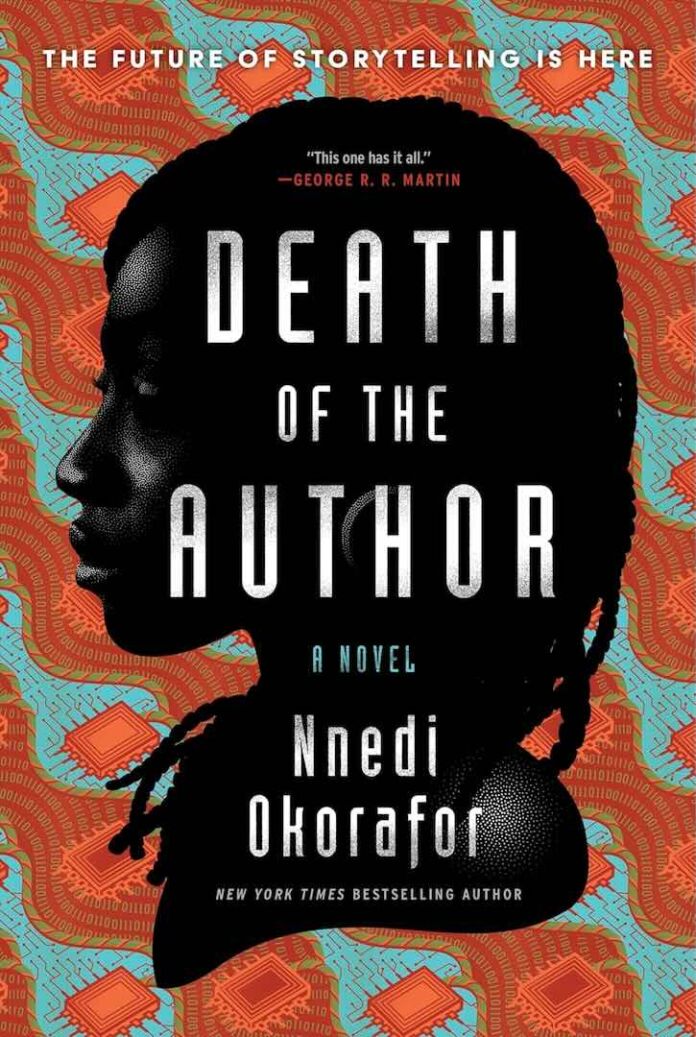In Death of the Author, Nnedi Okorafor delivers a uniquely compelling exploration of identity, creativity, and the essence of storytelling in a future shaped by artificial intelligence. With her signature style—a blend of lyrical prose and imaginative world-building—Okorafor tackles the existential interplay between life and art. The novel resonates with Okorafor’s established themes of resilience and otherness, while also daring to push boundaries, making it both a captivating read and a thought-provoking reflection on modern creativity.
Plot: The Entwining of Two Worlds
The novel follows Zelu, a tenacious but struggling writer who finds herself at a crossroads after a series of personal and professional setbacks. Losing her job and facing rejection for her latest manuscript, Zelu’s life reaches a pivotal moment during her sister’s wedding. In the solitude of her hotel room, she begins a daring new project—a science fiction tale about androids and humanity’s extinction. As her story unfolds, Zelu’s life begins to parallel her fiction in hauntingly unpredictable ways.
Okorafor masterfully layers the narrative, moving between Zelu’s tumultuous personal journey and the fictional world she creates. The androids in her story serve as a mirror to her own struggles, raising questions about autonomy, belonging, and the nature of existence. This dual narrative structure is executed with precision, keeping the reader deeply engaged. The climax, where the boundaries between Zelu’s life and her novel blur, is as unexpected as it is profound, leaving readers pondering the true power of storytelling.
Character Analysis: A Heroine for the Modern Age
Zelu is the heart of Death of the Author, and her characterization is one of Okorafor’s strongest achievements. As a disabled, unemployed writer from a family that measures success in conventional terms, Zelu’s journey is deeply relatable. Her vulnerabilities and inner strength are portrayed with a sensitivity that makes her both inspiring and achingly human.
The supporting cast, including Zelu’s family and her fictional androids, enriches the narrative. Her sister’s wedding acts as a microcosm of familial tensions, showcasing Okorafor’s skill in capturing interpersonal dynamics. The androids, though fictional in Zelu’s narrative, are imbued with startling realism, reflecting her—and perhaps humanity’s—struggles with identity and purpose.
Writing Style: Lyricism Meets Science Fiction
Okorafor’s writing is a harmonious blend of lyrical prose and cutting-edge ideas. Her descriptions of Zelu’s world are vivid, and her portrayal of the androids’ reality is hauntingly beautiful. The dialogues feel natural, yet layered with meaning, often serving as a conduit for deeper philosophical questions.
That said, some readers may find the transitions between Zelu’s reality and her fictional narrative jarring at first. While this stylistic choice reinforces the book’s theme of blurred boundaries, it requires careful attention and may not suit readers who prefer linear storytelling.
Themes: Art, Identity, and the Power of Storytelling
At its core, Death of the Author is a meditation on the transformative power of storytelling. Okorafor explores how narratives shape our perceptions of reality and ourselves. The novel also delves into identity, particularly through Zelu’s lens as a disabled writer navigating a judgmental world. Her struggles echo the broader questions of what it means to be seen and understood in a society often defined by conformity.
Another significant theme is the ethical and philosophical implications of artificial intelligence. Through the androids in Zelu’s story, Okorafor examines the potential of AI not as a threat but as a reflection of human complexity. This perspective offers a refreshing departure from the dystopian portrayals often found in science fiction.
Strengths and Weaknesses
Strengths:
- Imaginative World-Building: The dual narratives are intricately crafted, showcasing Okorafor’s unparalleled imagination.
- Relatable Protagonist: Zelu’s character is a triumph, serving as both an anchor and a lens for the novel’s deeper questions.
- Exploration of AI: The android narrative is fresh and thought-provoking, adding depth to the novel’s exploration of humanity.
Weaknesses:
- Complex Structure: The interweaving of Zelu’s life with her fictional story, while innovative, might alienate readers unfamiliar with non-linear narratives.
- Abrupt Pacing in the Middle: The novel’s pacing lags slightly in the middle, with some scenes feeling overly introspective.
Comparative Titles: Where This Book Fits
Fans of Okorafor’s previous works, such as Lagoon or Who Fears Death, will find Death of the Author a natural progression in her exploration of identity and futurism. For readers drawn to the intersection of AI and humanity, Klara and the Sun by Kazuo Ishiguro and Machines Like Me by Ian McEwan are excellent companions. Additionally, The Power by Naomi Alderman echoes the novel’s feminist undertones and its meditation on the transformative nature of power.
Recommendation: A Bold Journey Worth Taking
Death of the Author is a bold, thought-provoking novel that will appeal to readers who enjoy stories that challenge conventional narratives. While its structure and themes demand attention, the payoff is well worth the effort. This is a book for those who appreciate the intersection of science fiction, philosophy, and deeply human storytelling.
Conclusion: A Testament to the Power of Stories
With Death of the Author, Nnedi Okorafor has created a novel that is as much a story as it is a philosophical inquiry. It challenges readers to reconsider the boundaries of fiction and reality, while celebrating the resilience of the human spirit. Though not without its flaws, this is a book that lingers in the mind long after the final page, a testament to the enduring power of stories.





